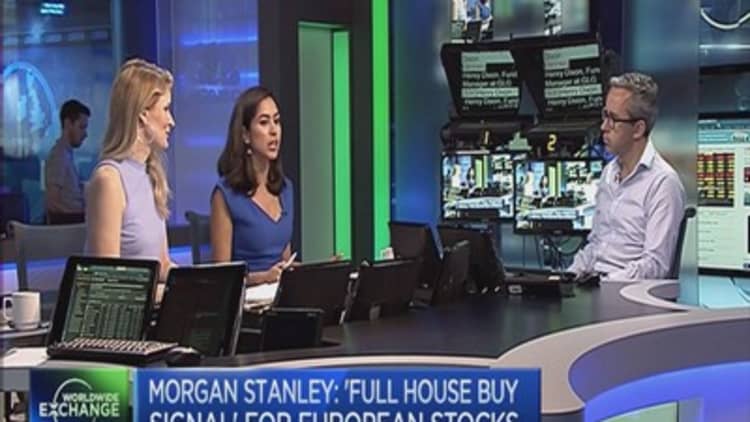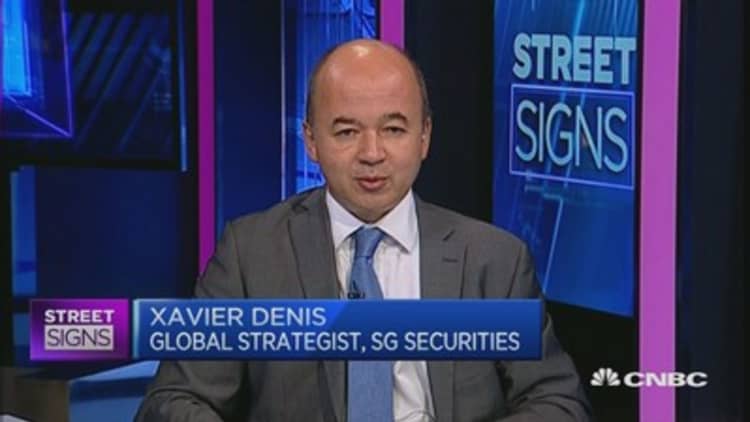


Worries about China's slowing economic growth continue to make markets around the world jittery. But most financial advisors are telling clients to keep their allocations for international stocks and some are even going on a shopping spree.
"We feel that the valuations remain attractive both in developed and especially in emerging market equities, and believe that this is a good opportunity for long-term investors to take advantage of short-term volatility," said Howard Pressman of Egan, Berger & Weiner in Vienna, Virginia.
With decades to go before retirement, millennials are particularly well-positioned to take advantage of the turmoil, said Tracey Eve Johnson, a certified financial planner and principal at Blue Flag Planning in Tarrytown, New York. "We find that these clients are usually able to maintain a long-term focus and stay the course during the inevitable periods of market turmoil," Johnson said.
Many financial advisors prefer foreign stocks because they have different risk and return characteristics than U.S. equities. That can diversify a portfolio and prevent "home bias," the tendency investors have to invest heavily in the stocks of their own country.
So how much exposure should investors have to global markets? The U.S. had about 36 percent of the world's market capitalization as of March 2015, according to Bespoke Investment Group. (China had about 9.4 percent.) That means a portfolio focused solely on U.S. stocks would exclude more than 60 percent of the equity opportunities available worldwide.
"Because my clients are in the U.S. and spending dollars, and also a bit for psychological comfort, I skew the allocation somewhat more toward U.S. equities than the strict market valuations would indicate," said Charles Levin, a certified financial planner in Wayland, Massachusetts. He recommends investors put 60 percent of the equity portion of their portfolios in U.S. stocks and 40 percent in international stocks.
U.S. mutual fund investors held, on average, only 27 percent of their total equity allocation in non-U.S. funds as of December 2013, according to an analysis by The Vanguard Group.
Vanguard found that a 20 percent allocation to international stocks is a good starting point for most investors. However, the additional expense of investing in international stocks can be a drag on returns. Though global markets have become more efficient, costs—such as expense ratios for international stock funds and bid-ask spreads—are usually higher for U.S.investors.
"[I]nternational allocations exceeding 40 percent have not historically added significant additional diversification benefits, particularly accounting for costs. For many investors, an allocation between 20 percent and 40 percent should be considered reasonable," Vanguard researchers concluded.
To be sure, in a global economy, most large U.S. companies have some exposure to international markets.
Last year, the percentage of total revenue from sales in foreign countries grew among S&P 500 companies after five years of stagnation, according to research from S&P Dow Jones Indices. The overall rate for 2014 was 47.8 percent, up from 46.2 percent in 2013.
S&P 500 sales from Asia grew last year, but not rapidly, with 7.8 percent of S&P 500 sales coming from Asia, up from 7.7 percent in 2013 and 7.5 percent in 2012. Many large U.S. companies do not break out sales for China, however, making it difficult to track exactly how a slowing of Chinese economic growth will affect their earnings.
The key for long-term investors is to have a good mix of international stocks or stock funds that is not concentrated on one region or country, advisors say.
"The turmoil in China only becomes an issue if you are not diversified and overweighted in China," said Scot Hanson, a certified financial planner at EFS Advisors in Shoreview, Minnesota. "If the situation in China does matter [to you], you have the wrong plan, strategy and advisor."




